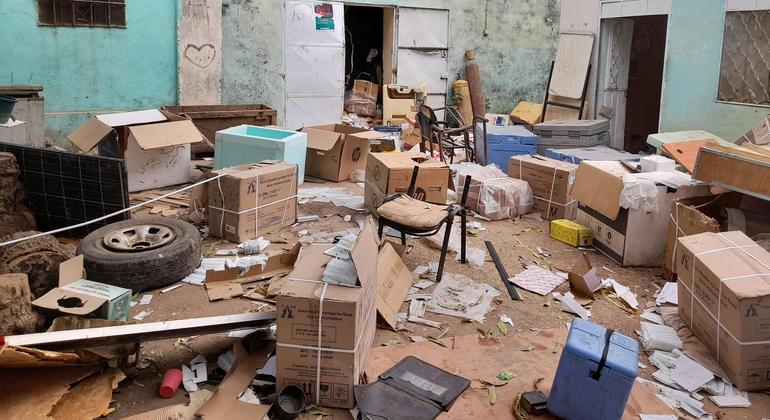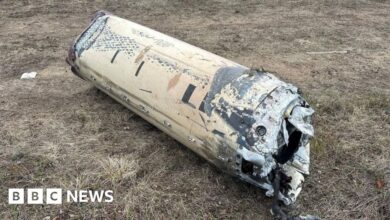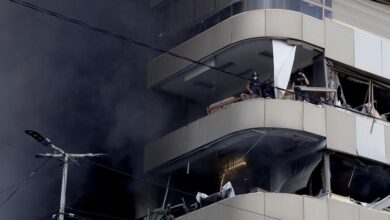The Security Council called for better protection for humanitarian workers

Lisa Doughten addressed Ambassadors at the Council briefing on preventing and responding to attacks against humanitarian personnel and the United Nations, in accordance with Resolution 2730 (2024), passed in May.
“As we consider the next steps of resolution 2730, we call on this Council to support action to protect humanitarian workers and United Nations personnel; ensure accountability for those who harm them; and help survivors and families rebuild their lives,” she speak.
The Gaza conflict fueled the increase
So far, 282 aid workers have been killed this year in places like Gaza and Sudan, according to the Humanitarian Organization, the independent research group that maintains a database of all major incidents spanning from the 1990s.
Other colleagues were injured, kidnapped, attacked, and arbitrarily detained, and most of the victims were mainly local employees.
Ms. Doughten said much of the unprecedented spike in casualties was due to the situation in Gaza. Since the war began last October, more than 330 humanitarian workers have been killed, most of them employees of the United Nations agency assisting Palestinian refugees. UNRWA.
“These figures signal a worrying lack of concern for the lives of civilians, humanitarian workers and United Nations staff. There is no situation in recent history that can be compared,” she said.
“So as we gather today to seek concrete actions that Security Council and that expanding UN membership can help strengthen the protection of aid workers, my first message is: Help protect my colleagues in Gaza.”
Call for protection
Despite the real dangers, humanitarian workers and the United Nations have remained and provided life-saving assistance to more than 116 million people worldwide this year.
They must be protected, Ms. Doughten emphasized.
While welcoming resolution 2730, she emphasized the urgent need for the Council to unequivocally condemn attacks on aid workers.
“Our partners want to see fresh, clear political support from the Security Council and Member States for aid workers and their safety,” she said.
“They want you to use diplomatic and economic pressure to force them to respect international law. They demand, as does the Secretary-General, an end to arms transfers to anyone who violates international law.”
Responsibility for crime
UN partners are also concerned about the irresponsibility of perpetrators of crimes against humanitarian workers and how this encourages further crimes.
“They want to see more systematic and universal accountability for serious violations,” she continued. “They want Member States to fight against impunity with political will and action, including through legislation ensuring accountability for crimes against humanitarian workers – both domestically and internationally.”
Aid partners also want the Council to do more to ensure accountability, she added. This includes encouraging international cooperation to facilitate investigations and prosecutions, and where national jurisdiction fails, establishing international mechanisms or to the competent authority. International Criminal Court (ICC).
The final area of action involves supporting harmed humanitarian workers. Measures include allowing survivors to participate directly in global discussions, including at the Council, as well as reparations and legal aid.

Take action now
The head of the United Nations Service for Safety and Security (UNDSS), Gilles Michaud, stated that resolution 2730 has never been more important.
He reported that today, UN field operations face greater complexity, greater demands in higher risk areas and threats to UN and institute staff. aid, including State organizations.
“Let me be clear. My greatest concern is the profound lack of accountability for violence against humanitarian organizations and United Nations personnel. And now more than ever, we need you to act,” he told the ambassadors.
Mr. Michaud noted that host countries and United Nations Member States bear primary responsibility for the safety and security of Organization personnel and for the protection of Organization facilities.
He called on all countries to participate United Nations Safety Convention and related personnel and its Optional Protocols and their full implementation.

Intentional and accessory violence
Abby Stoddard is a partner and director of Humanitarian Outcomes, which compiles the Aid Worker Confidentiality Database.
She said 30 years ago, fatal attacks on aid workers were not common.
Back then, the main threats they faced were accidents and disease, but “today, violence – both collateral and targeted – has claimed the lives of more aid workers than ever before. any other work-related cause.
She noted that 2023 was the deadliest year on record, with 280 deaths, but 2024 exceeded that “terrifying total.”
Ms Stoddard echoed the call for greater protection and responsibility.




